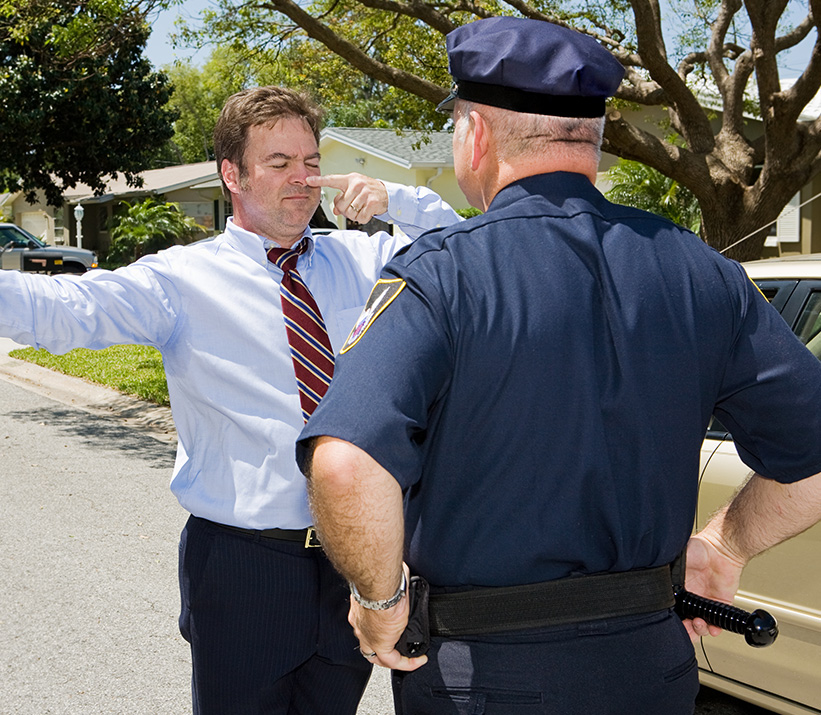Menu
Miami Dade
Broward
available 24/7
(Hablamos español)
Miami Dade
Broward
Practice Areas / DUI & DWI Defense / HGN Exercise

The HGN (Horizontal Gaze Nystagmus) is a DUI exercise where a police officer will ask an individual that is under investigation to follow the tip of a pen light with his eyes.
Horizontal Gaze Nystagmus (HGN) refers to a lateral jerking when the eye gazes to the side. Alcohol consumption hinders the ability of the brain to correctly control eye muscles, therefore causing the jerk or bounce associated with HGN. According to the NHTSA manual the HGN Test should be administered in a well lit area, set away from the traffic and the flashing lights of the police vehicle. The HGN test requires an object for subjects to follow with their eyes, such as the tip of a penlight. The officer places the object approximately twelve to fifteen inches from the subject’s face and slightly higher than eye level. The officer instructs the subject to follow the object with his eyes while his head remains still.
NO – Roadside exercises are NOT TESTS. They are simply measuring devices used to try to measure potential impairment.
After positioning the object, but before conducting the test, the officer checks for signs of medical impairment. First, the officer checks for equal tracking by moving the object quickly across the subject’s entire field of vision to see whether the eyes follow the object simultaneously. The officer then checks for equal pupil size. Lack of equal tracking or equal pupil size may indicate blindness in one eye, a glass eye, a medical disorder or an injury. If the subject exhibits lack of equal tracking or equal pupil size the officer should discontinue the HGN test since the results
If your case calls for a jury trial, the trained DUI lawyers at Gilbert and Smallman will cross examine the officer on their procedure. Often times this exercise is conducted by an officer who is not properly certified to administer the test. The officer is required to complete at least 20 practice tests in order to be properly certified to conduct the HGN test. Also, a portion of the general population has a natural nystagmus without consuming any alcohol at all. Consequently, the results of the test can be misleading when used as a measure of impairment. The bottom line is that if these exercises are not performed in the manner in which the NHTSA prescribes, the police officer will look biased in front of a jury for making assumptions about impairment, when in fact, they haven’t done their job correctly. We are able to turn the tables on the police and put them on trial.
It is your liberty and license at stake, and we take that very seriously. Please visit our case victories to learn more about some of the results we have had on DUI cases in the past. We offer free consultations and payment plans to those in need. Get in contact with an experienced Miami, Fort Lauderdale or Tallahassee DUI lawyer today. We answer our phones and are happy to speak to you about your case.
Fill out form below to have one of our experienced trial attorneys contact you immediately. (All communications are protected by Attorney / Client privilege):
hablamos español
ADDRESS Law Offices of Gilbert & Smallman PLLC 3475 Sheridan St. #301 Hollywood, FL 33021 CELL (954) 661-7371 OFFICE (954) 251-3106 FAX (954) 404-6003
ADDRESS Law Offices of Gilbert & Smallman PLLC The White Building One Northeast Second Ave, Suite 200 Miami, FL 33132 CELL (786) 371-4431 OFFICE (786) 863-8568
ADDRESS Law Offices of Gilbert & Smallman PLLC 909 East Park Avenue Tallahassee, FL 32301 OFFICE (850) 391-7045 FAX (850) 391-6152
ADDRESS Law Offices of Gilbert & Smallman PLLC 12550 Biscayne Blvd, Suite 800 North Miami, FL 33181 CELL (786) 371-4431 OFFICE (786) 863-8568 FAX (954) 404-6003